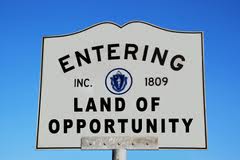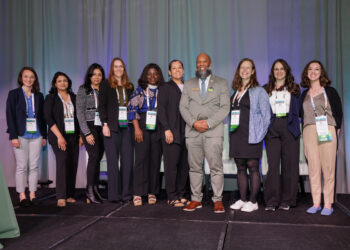 It seems as though very few folks actually aim for a career in scholarly publishing. It’s something most of us fell into along the way.
It seems as though very few folks actually aim for a career in scholarly publishing. It’s something most of us fell into along the way.
David Smith’s path is illustrated in his response below. Mine was even less targeted, having worked in 8 different industries before publishing (banking, telecom, disaster recovery, technology consulting, pharma logistics, NYC government office, media — anyone remember Prodigy! — and two software development companies).
But what if you are aiming for a career in scholarly publishing and communications? This month we asked the Chefs:
What advice can you offer someone seeking a job in scholarly publishing?
Kent Anderson: There are many ways to enter scholarly and scientific publishing. One framework I use to think about this is to separate the mentality of the “know-it-all” from the “learn-it-all.” There are some people who come in with big degrees and a lot of education, only to struggle because they think they know it all. For most people who succeed in the field, the “learn-it-all” mentality is much more viable. Things are moving too quickly for a know-it-all mentality to work. There is just no way to know it all, and acting like you do actually makes you a less appealing job candidate. When I started in publishing, laser printers and PostScript were relatively new. I remember reading technical books to understand PostScript and how laser printers communicated with computers. Soon, HTML became a big deal, and I learned that, along with SGML and XML. Next, relational databases became important, so I learned about those. Now, data services are a big deal, and I’m learning about those as fast as I can. This “learn-it-all” mentality is important to embrace if you want to find work in this rapidly changing field.
So, my advice to someone wanting to enter the field through any of the dozens of possible doors would be to find the parts of scholarly publishing that interest you, learn as much as you can about the cutting edge elements, and start networking with people talking about those things while applying for jobs. Even if you don’t get an “on the nose” job to start, you’ll soon find that what you’ve learned, who you’ve met, and what you know will work in your favor. And you’ll also find that generally people in scholarly publishing will be very supportive of your “learn-it-all” mentality, especially those in the SSP community.
Charlie Rapple: First, I’m sure you’ve thought this through, but just a last minute check at the door: is it definitely scholarly you’re looking for? Move along if what you seek from a publishing career is big-name authors, glossy artwork, long liquid lunches and glitzy launches. They’re not entirely missing from scholarly publishing, but most of us don’t see much of that.
What we see a lot of is technology, and we get quite excited about it — beyond books and journals, much of our focus these days is on getting “content” into people’s “workflows” rather than making them come to us for it. So if you’re looking for a job in scholarly publishing, read up on things like research support tools, search engine optimization and text- and data-mining. You might want to gain a rudimentary understanding of the infrastructure that enables all of this: metadata (check out Crossref), identifiers (for example DOI and ORCID), and standards (start with COUNTER).
Still interested? Well, strap in — scholarly publishing is a fast-evolving field to work in. It has led the industry in terms of digitizing content and continues to see rapid change in everything from business models to author / reader expectations (think about how your favorite websites and apps influence how you expect every digital process to work — and then imagine trying to impose that retrospectively on systems developed before smartphones, for example). It’s an inspiring and exciting sector — which helps to offset the fact that in many roles you might find the salaries will be lower than in other sectors (so be sure you’re happy with the going rate for your area of expertise if you are coming from another sector).
Just starting out and unsure what your area of expertise might be? Talk to a career advisor, a mentor, family or friends, to get a rounded view of your skills and strengths, and to explore what makes you tick. If you’re process-oriented, for example, you might enjoy a production role. If you are creative, try marketing. If you’re passionate about a specific area of study, perhaps your future is in an editorial role. And don’t forget there’s a wide range of organizations that aren’t publishers themselves but are closely integrated into the sector — often providing the opportunity to work with many different publishers and thus gain broader experience. In summary, there’s a lot going on under the hood in scholarly publishing. Taking a bit of time to learn about the diverse range of activities, and figure out which ones you are most interested in, will hopefully help you more quickly find the job for you.
Alison Mudditt: To the horror and embarrassment of my current self, I’m pretty sure that I muttered something about my love of books in my 1988 interview at Blackwell. The industry has changed enormously since then and even if that was enough in those days, my work today is characterized by constant change and challenge and has little to do with my still voracious reading. There are always far more applicants than jobs, especially at the entry levels, so here are just a few tips to get in:
- Build industry and market knowledge. Seek as much information as possible from a wide range of sources – industry groups such as SSP, scientific and scholarly associations, online networks, and also the information and tech industries more widely. Like all industries, traditional publishing is increasingly challenged by new technology and new players, and so it’s critical to understand the bigger picture.
- Start to build a professional network. Informational interviews are a great way to learn more, and many of us are happy to help people who are just starting out. Make sure you’re well prepared and always follow up with some kind of thank you, then connect via social networks so you can stay in touch.
- Any experience is good experience. Try get some hands on experience – as much as you can, doing anything and everything that you can – to help your application stand out and to demonstrate your commitment. Many publishers offer internships (and associations such as PSP provide information about these opportunities).
Michael Clarke: The best, and perhaps only, way to land a job in scholarly publishing is to look for a job in another field. There are very few individuals who purposefully pursue a career in scholarly publishing as there are very few people who are aware such a thing even exists. And even for those that are of aware of the existence of the field and careers therein, it occurs to even fewer that such a thing might be desirable.
The career path of absolutely no one begins with graduating from college and applying to work at scholarly publishers the way one might with say, a consulting firm or an investment bank. For one thing, scholarly publishers would be suspicious of anyone seeking purposely to work for them that was not already working in the industry. Such a person might be invited in for an interview but only in the way that the super villain might invite James Bond in for a tête-à-tête before attempting to toss him into a tank of sharks (I am not here implying that publishers are super villains or even villains in a more pedestrian sense – they don’t have the wardrobe budgets for evil doing).
So how do people land their first job in the industry? The answer is invariably “sheer accident.” They stumble into it much as one might come across the village of Brigadoon whilst hiking in the Scottish Highlands. Often there is a funny story or misunderstanding involved. Sometimes someone shows up at the wrong interview. Often people start working on a project not realizing it is connected to an actual industry. You can’t try to work in scholarly publishing – that is the worst possible thing you can do. If you really want to work in the field, you must clear your mind of all thoughts connected to it. Only then will a job appear.
Joe Esposito: My recommendation for people seeking a career in scholarly publishing is to think about their career as strategically as they would about a business they are running. What is the long-term vision (i.e., what do you think the industry will look like in the future?), what do you want to end up doing (i.e., what is your personal mission?), and how do you get there from here (call this your career strategy).
I can’t help anyone with the second and third points because they are personal, but as for point #1, where is the industry headed?, I would advise young people to consider the fact that the net number of employees in the U.S. in 5 years in scholarly publishing will be lower than it is today. The industry is globalizing, and not even Brexit, Bernie Sanders, or Donald Trump will stop that. Employment will see equilibrium across all markets, but especially in the Anglophone world. Your rival for your promotion lives in Bangalore or Johannesburg.
Alice Meadows: I’m not sure that my advice for someone seeking a job in scholarly publishing is much different from my advice to someone seeking a job in any industry. The three things that have worked for me both as a hiring manager and when applying for jobs myself are:
- know your stuff, i.e. do your homework about the industry, the organization, and the role. As a hiring manager it’s a complete waste of time interviewing someone who doesn’t know anything about your organization or understand what they’d be doing in the job they’re applying for. And as an interviewee it’s nothing short of mortifying to be caught lacking such a basic level of knowledge (I did it once very early on — never again!)
- be (genuinely) enthusiastic — or as one friend put it “it may sound obvious but make sure they know you really want the job”. For the most part you can train people in the technical skills they need to succeed but you can’t train them to be passionate about their work. Being truly interested goes a very long way in pretty much any situation — and especially when you want to break into a particular industry or organization
- get networked — check for any existing connections (yes that includes LinkedIn), tell them you’re looking for a job, and if appropriate see if they can help you get an informational interview. Also look for ways to make new contacts — industry conferences can be helpful for this and many have new attendee events that are good ways of meeting people. Get on social media and follow/retweet people in scholarly publishing who are themselves well connected.
And one salutary reminder — scholarly publishing is a small and somewhat incestuous industry so don’t burn any bridges!
David Smith: Seeking a job? Ok, the first job you land, is quite possibly NOT the job that you will turn into a career in scholarly publishing. It’s quite possible that you will transit through a number of fields, each with their own ways of thinking about the world. And you may well end up bouncing between for-profit and not-for-profit organizations, each with their own idiosyncrasies as well.
So pitch your transferable skills (spend a bit of time on this, get some external perspective if you can; if there’s a course to help you do this analysis, take it). When you start:
- Seek out your friends in IT (trust me on this, most important people in the building), food works well here.
- Seek the chances to experience the other aspects of the business. Even if you stay say in editorial or production or sales, you will benefit greatly from the perspective.
- Those exhibition stands you will spend time standing on? Yup, use those too, to expand your knowledge and experience.
[David: In House Editor; WebMaster; Publishing Editor; Innovations Manager; Head of Innovation; Head of Product Solutions; Molecular Biology; Critical Care Medicine; Agriculture and the Environment; Plant Health; Engineering; Start-Up; Not-For-Profit; Charity]
David Crotty: I’m going to take a slightly different tack than my colleagues above and talk about the path from the laboratory into publishing (and yes, some of us actually did this on purpose). I used to give talks about publishing as an “alternative career”, but as the numbers have shifted for Ph.D. recipients, staying in academia is now the “alternative” open only to a few. If you love science, or history, or whatever your field, but don’t feel the academic structure is a great fit, publishing is an excellent route to staying involved in your community from a different angle. Plus, the hours are much better.
So, if you’re far along enough in getting your degree that you’re thinking about the next steps (or are doing postdoctoral research), some suggestions to help set yourself up for a career in scholarly publishing:
- Finish your degree: if you’re already a ways along, having a Ph.D. opens up more jobs for you. There are fairly regular openings for journal editors (often assistant editors as an entry-level position) or book editors at many publishing houses. Having a degree and a solid publication record can help you land one of these jobs. It’s a great place to make a transition. You’ve just spent years deeply enmeshed in a field, and in an editorial job where you work directly with articles and chapters, you can put that hard-earned knowledge to direct use. And the experience you’ll acquire here will open up higher level positions across the industry for you.
- Write and edit in your lab: are your colleagues working on their own articles? Here’s a chance to help them out and hone your skills. Offer to read drafts and work with them on improving their submissions.
- Peer review: If you’re going to work for a journal, you’re likely going to be managing peer review on some level. The more experience you can gain, the better. Plus, working as a peer reviewer helps you build connections with editors already in place.
- Freelance: Many publishers outsource copyediting to freelancers, and freelancers with subject area knowledge are particularly helpful. Find the journals in your specialty and reach out to their publishers. This is also a great way to supplement a postdoc salary. Be prepared to copyedit a test article to prove your skills.
- Become involved in your research society: If your society publishes a journal, there’s likely a publications committee, and those committees love to have representation from early career researchers. See if you can volunteer — again, this will help you build a network and give you an insider’s view on how journals work with societies.
- Make connections and build a network: This is probably the most important thing you can do, regardless of where your career takes you. As a journal or books editor, having a solid network of peer reviewers and potential authors is incredibly valuable. Hang out with your fellow students and postdocs. Collaborate. Go to meetings. Talk to people at poster sessions. Buy the speaker a drink. When someone interesting visits your institution to give a talk, find out if you can join the group that’s taking them to lunch. Meet people in your field, get to know them.
- Pay attention to technology: As others have said above, publishing is a technology industry. Pay attention to what’s going on both within publishing and elsewhere in the digital world. Having a basic knowledge of current trends definitely gives you a leg up.
_____________________________________
The bottom line appears to be: be prepared, be open to serendipity, take advantage of every learning opportunity, meet as many folks as you can, and keep an open mind. Adding a healthy dose of passion and enthusiasm to that recipe may also help distinguish you from your peers.
Now it’s your turn. How might you advise someone seeking a job in scholarly publishing?
Discussion
9 Thoughts on "Ask The Chefs: What Advice Can You Offer Someone Seeking A Job In Scholarly Publishing?"
I’m the old guy. If you want to be an editor: Get a job with a college publisher as a sales rep. Learn what your customers – professors – actually do. If you want to be an acquisition editor, by being a college rep you will learn markets and what is needed. Never fail to ask all sorts of questions when calling on profs they will tell you what is needed, what they do, why they do it, how they do it, where they do it, and with whom they do it with. Stay in the field for about 4 years and then start looking to go into editorial – that is if that is what you want to do.
I would recommend understanding the importance of metadata generally and the role of XML specifically, in the field. It’s an excellent transferable skillset.
Learn IT; Cloud Infrastructure, big data principles, data security, code, etc. You don’t necessarily have to specialize in it, or start another career, but get some passing familiarity with it. Content is largely available. You have, right now in your pocket, a device that contains the entire sum of human knowledge. How do we deploy that? How do we turn that into a valuable learning experience? How do we empower faculty to be a true value-add in the classroom rather than regurgitating content that is largely consumable by the masses? These are the questions you’ll be asked to solved – much moreso than finding the next great Econ textbook. (note: comments apply to k/12+higher ed “textbook” publishing. Scholarly works, peer reviewed journals, etc…mileage may vary).
Although several of the chefs mention the value of networking, no one points specifically to the networking that can ensue from attending publishing courses like those offered by Denver, Columbia, etc. Graduates from those programs can be an immediate source of networking into the publishing business. I agree with David C. that some graduate school experience is valuable, but disagree that a Ph.D. is really needed or even a great benefit. I had two years of graduate school under my belt when entering scholarly publishing (as a copyeditor, soon becoming an acquiring editor), and they proved a good background for my future work, but spend several more years getting a Ph.D. would not have advanced my career in any significant way. I also disagree with Michael that aiming for a career in scholarly publishing is misguided. I decided that scholarly publishing would be the best place for someone with my skills and then sought out a job in the field. As director of a university press I also supported and encouraged students from the university to get ready for careers in the field by becoming interns at the press and thus acquire on-the-job training, which gave them a great advantage in seeking entry-level positions elsewhere on graduation.
I think the value of the degree depends on the job, and how much you’re actually working “hands-on” with the material. I spent several years doing developmental editing, book acquisitions and as the editor in chief of a journal. In each of those cases, having a PhD was probably helpful, if not required. Part of the degree process is learning a field, learning how to do research, learning how to read and write a paper. It’s unlikely that you’ll be hired as a journal editor without an advanced degree.
But that’s not to say that you absolutely need an advanced degree. Much of my job now is far removed from the actual scientific material itself, and perhaps might be better served by having an MBA than a PhD in genetics. But I can’t say that having a degree has harmed me in any way, other than putting me several years behind many of my colleagues who came straight out of college to publishing.
Know how to work a database. Everything we do is database driven whether its the submission system, the structured content, bibliographic databases, platforms, etc. Being comfortable with databases and reporting from databases is relevant for about every position I can think of.
“The career path of absolutely no one begins with graduating from college and applying to work at scholarly publishers[…]” Mine did.



